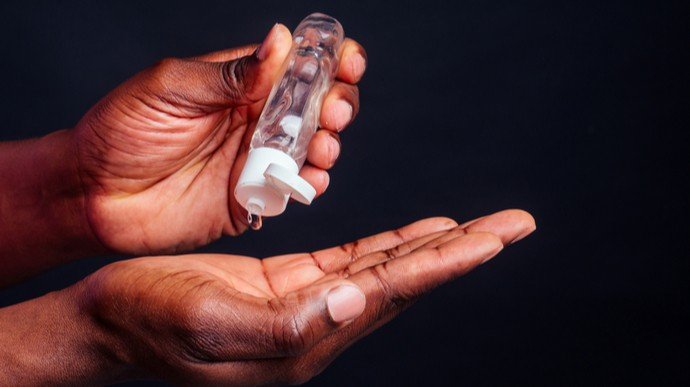Thabo Mohlala
A recent study by a University of Pretoria (UP) based scientist, Dr Abdullahi Ahmed Yusuf, discovered that commercial, off-the-shelf hand sanitisers used by the public in Gauteng and Tshwane are substandard. This means the products fall far short from meeting the World Health Organisation (WHO)’s recommended alcohol content requirements. In addition, they are mostly incorrectly labelled according to local and international standards said Dr Yusuf. He is senior lecturer in entomology in UP’s department of zoology and entomology in the faculty of natural and agricultural sciences.
Lack of adherence to standards
According to Dr Yusuf an analysis of the products found that sanitiser solutions did not contain alcohol compositions for ethanol and isopropanol as recommended by the WHO. He said most of these products did not have the required 70% ethanol recommended either by the US Centres for Disease Control and Prevention. Hand sanitisers are used globally as part of the non-pharmaceutical measures in the fight against COVID-19. Alcohol content and concentrations are imperative for a sanitiser to have virucidal activity but these findings, according to Dr Yusuf, suggest a widespread lack of adherence to the required composition.
Driven by profit
Dr Yusuf expressed concern about the substandard alcohol compositions of the sanitisers. “The results from the study, which involved testing a range of readily available sanitisers in the Tshwane area for compliance with international standards are concerning. There are several substandard hand sanitisers out there; this is driven largely by profit. For example, because ethanol is an expensive solution, if you cut corners on 10%, that equates to more profit,” said Dr Yusuf. He said government should beef up its monitoring capacity of sanitiser products as some manufacturers have failed to spell out what they contain, which is a deviation from the local standard. He said what is even more concerning is the inconsistency in the amount of ethanol in these sanitisers as it affects their efficacy.
Most common alcohol
Using gas chromatography, Dr Yusuf analysed 50 products of different origins and formulations obtained off the shelf and in public places in and around Pretoria for their alcohol content. He said ethanol was the most common alcohol used, followed by isopropanol. Only 21 (42%) of the products analysed contained at least 70% alcohol; of these, only 14 (28%) met the WHO’s recommended 80% alcohol content to have a virucidal effect on SARS-CoV-2.

Country-wide problem
Dr Yusuf said the problem of substandard sanitisers is not confined to Gauteng and Tshwane but it is a countrywide challenge. The study revealed that of the 41 commercial off-the-shelf products analysed, 27 (66%) contained less than 70% alcohol in comparison to 13% of homemade products. Only 18% of gel products contained 70% alcohol, compared with 47% for liquid-based products. Most of the products did not contain the appropriate or correct declaration as recommended by the South African National Standards (SANS 289 and 490).
Stricter regulations
He called for stricter regulations and enforcement to protect the public, their rights and their well-being during and after the COVID-19 pandemic period. In the interim, Dr Yusuf said formulation of alcohol-based hand sanitisers using WHO guidelines should be mandatory. Curiously, however, homemade alcohol-based hand sanitisers conformed to a greater degree to WHO standards, the study observed. D Yusuf said a direct rapid, reproducible gas chromatography method for the determination of alcohol composition in hand sanitisers that can be used for quality control was developed and optimised as part of the study.
Exposing population to COVID-19
Most commercial alcohol-based products do not contain the required amount of alcohol to be classified as effective virucides, especially against SARS-CoV-2, the causative agent of COVID-19, noted Dr Yusuf. He said the presence of these fake products that purport to be quality-assured hand sanitisers pose serious health risk to consumers. In addition, they expose the population unknowingly to the virus by increasing the chances of transmission via contaminated surfaces.
Using WHO’s guidelines
Dr Yusuf recommended that quality control measures – especially at the manufacturing, wholesale and retail levels – need to be put in place. He said in the absence of appropriate quality control measures, preparing alcohol-based hand sanitisers using the WHO’s guide for local formulations remains a better alternative to purchasing off-the-shelf products that are primarily substandard.







